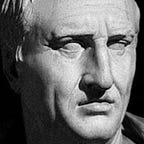Reality Objects
From Kant to the coronavirus, the noumenon finds a way.
As an overconfident undergraduate dedicated to Sartre and relativism — as I still largely am, with important modifications — I once challenged a pragmatic philosophy professor how we could ever know what was really real.
“Reality objects,” he said. “Reality pushes back.”
Reality has been pushing back, hard, on a lot of our assumptions and institutions as the coronavirus pandemic seeps into daily life. While the ultimate effects on the U.S. population remain to be seen — they look worse by the day — the effects on our post-truth regime (in all senses) may prove as important. The crisis is piercing not just immune and healthcare systems, but media bubbles, in what feels like an overdue denouement to a prolonged epistemological crisis.
Let’s go back to Kant (if I may be allowed a Maddowesque wind-up), who secured knowledge of the world by — counter-intuitively — cutting off contact with it. While this is uniformly baffling to non-philosophers, he had his reasons. Foremost among them was the fear — alien today — that the laws of physics were subject to change without notice. By making these necessary laws of experience instead of laws of the world (and redefining “world” down as the object of that experience) he accomplished his aim, but blocked us off from knowing anything about the…
